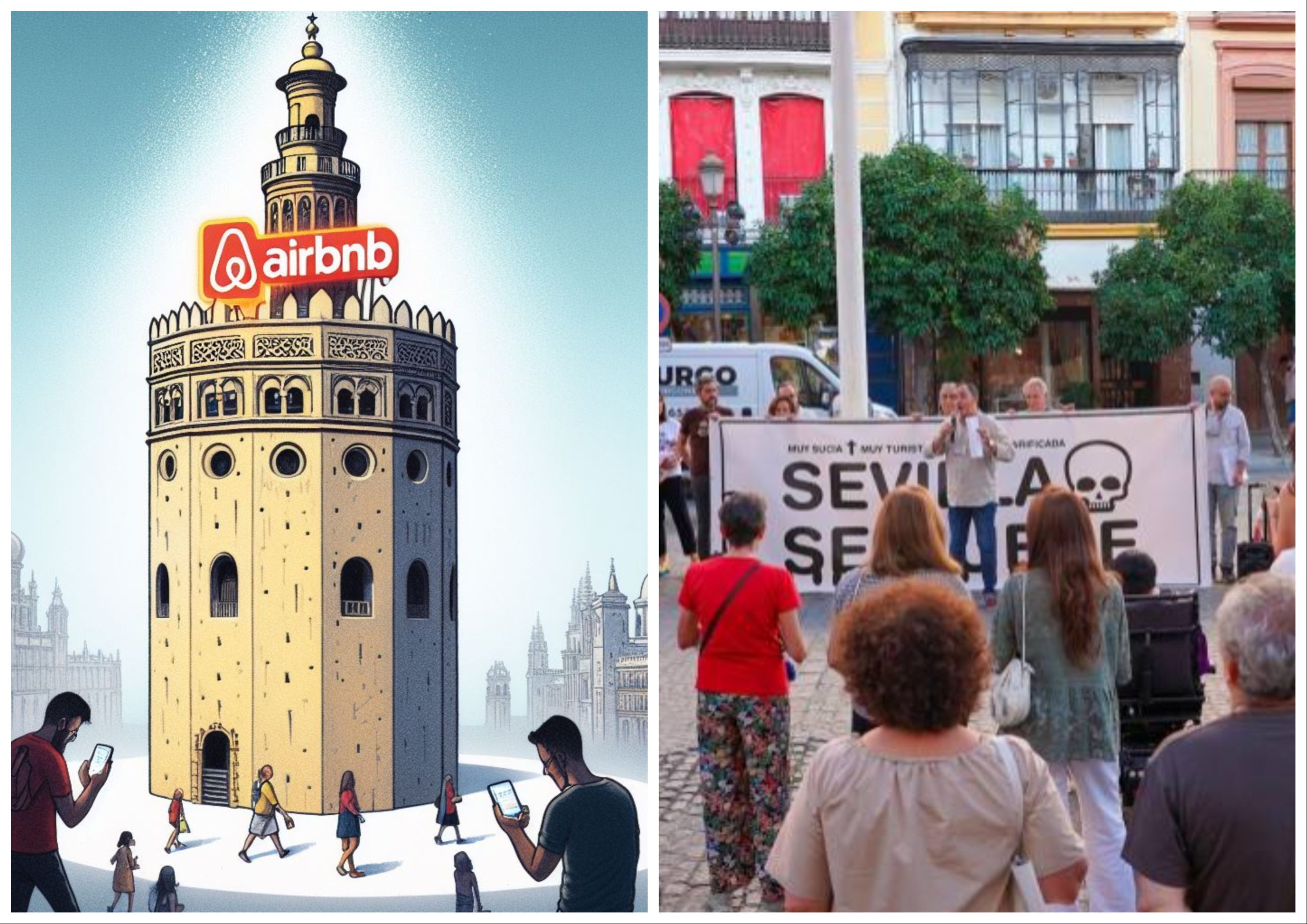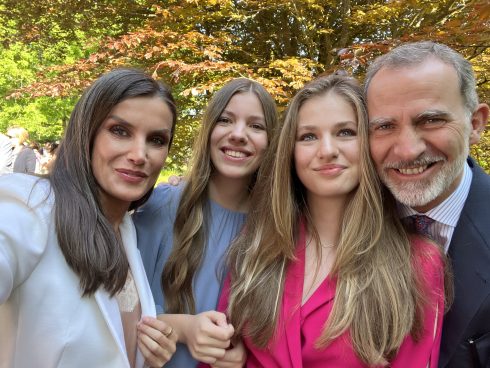SPAIN is increasingly finding itself in a catch-22 situation when it comes to tourism.
Its economy heavily relies on the industry, which is expected to bring in a staggering €172 billion this year, and which – for at least six months of the year – creates millions of jobs.
However it often comes at a price for locals who happen to live in the most popular areas for holiday makers – including Mallorca, Barcelona and the Costa del Sol.
A surge in Airbnb apartments is creating a scarcity of long term rental and buying options for residents, in turn causing prices of both to increase dramatically.
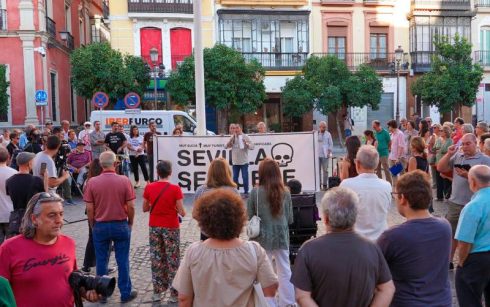
Meanwhile, more and more tourists are visiting, creating what campaigners have branded an ‘excessive model’ which brings too much noise and rubbish pollution and often crime, such as fighting and increasing numbers of sex offences.
It is perhaps understandable, then, that more anti-tourism movements have been popping up across the country.
The most recent involved a man arrested for targeting foreign plated cars with graffiti and puncturing their tyres along the Golden Mile in Marbella. The high-end cars, including Mercedes and Porsches, were left with zig zapped pink graffiti along their wings.
Meanwhile, in Barcelona, dozens of walls were daubed with the message: ‘Go home, tourists!’. And in Mallorca, locals erected fake signs in English and German declaring beaches and other landmarks were closed, with a small print in Mallorquin revealing they were in fact open.
The ruse was an attempt to keep the beauty spots, mostly small beaches and coves, free from foreign visitors, who they blame for rising property prices and other local woes.


Now, joining their chorus are the locals in Sevilla, which has become the latest destination to launch an anti-tourism campaign amid skyrocketing rents and creeping inflation.
Fed-up Sevillanos gathered in the streets last month, to demand more controls for the industry, which they claim is ‘devouring’ the historic capital of Andalucia.
The new ‘Sevilla is dying’ campaign (Sevilla se muere)’ claims tourists are causing too much pollution while sparking a surge in Airbnb properties that only serve to make long-term rentals less available.
This, in turn, forces locals to move further away from the city centre due to increasing rents.
The city is now the second most visited in Spain, after Barcelona, thanks to its celebrated landmarks such as the Real Alcazar palace, the cathedral, La Giralda and its iconic Plaza de Espana.
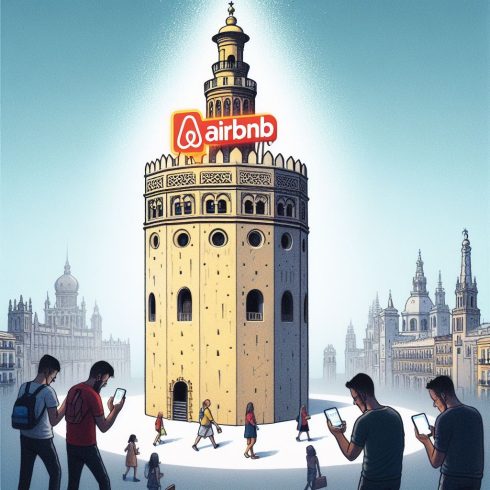
Some three million tourists visited the city last year and the numbers will be even higher this year.
And with a population of around 688,000, that equals about five tourists per inhabitant, meaning the city often feels swamped with visitors.
In a bid to battle the ‘oversaturation’ of the city, a new political party has been formed, called SevillanosORG.
A video shared on Twitter a fortnight ago showed the city centre filled with tourists wheeling their suitcases, even in late September.
“This is the 25th of September… completely invaded by tourists. We must act now or we will end up like Venice,” announced the clip.
“In the next elections don’t vote for political traitors, vote for SevillanosORG, who want to save Sevilla!”
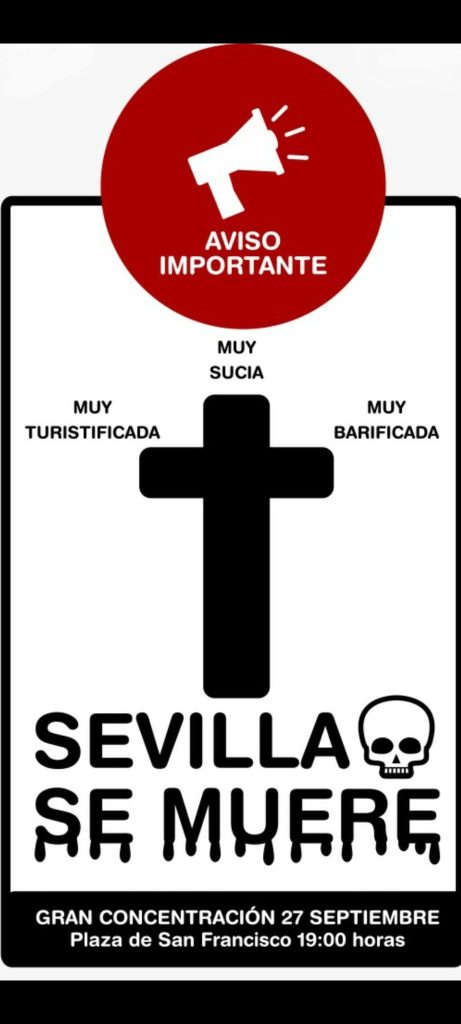
Despite promising to cut back the granting of tourist accommodation, the current conservative city council, led by Partido Popular’s Jose Luis Sanz, approved 16 licences for tourist apartment complexes in July alone.
Yet, during his election campaign, he had vowed not allow ‘even one more tourist apartment’ in the city. Typical politician.
David Lopez, a representative for Sevilla Se muere, claims the city is being ‘devoured’ by ‘uncontrolled’ tourism.
He told the Olive Press tourists are ‘invading’ public spaces and making them ‘unlivable’ for locals, who now feel like mere ‘extras’.
Local Veronica Conde added she is tired of having to live with the noise and garbage of tourists who treat her community ‘like a hotel that the locals pay for’.
Sevilla’s city council stressed the need to ‘work on tourist coexistence’ and confront ‘the problem of tourism phobia that we are beginning to have.’
However locals rejected that term, claiming they do not reject tourism, only its current ‘excessive form’ which they say ‘violates the fundamental rights of citizens, saturates our public services and degrades our spaces, coexistence, and historical, natural and cultural heritage.’
But it seems the government has little desire to rein in an industry that brings so much to the economy.
For property owners, for example, it is far more lucrative to turn your flat or home into a short-term holiday than to rent it out long term.
Not to mention the legal nightmares that can come with tenants who refuse to pay for months on end, or even worse, squatters.
Isabel Ferrer and her brother own three properties in Sevilla and Marbella telling the Olive Press they simply cannot afford to rent them out long term.
“When we rent long term it’s always given us loads of problems as the law always protects the tenant without any protections for the landlord,” explained Ferrer, a journalist and teacher, who lives in Marbella.
“Once they sign they can stay for up to five years which was never a problem, but a new law this year says that you cannot raise their rent by more than 2% each year.
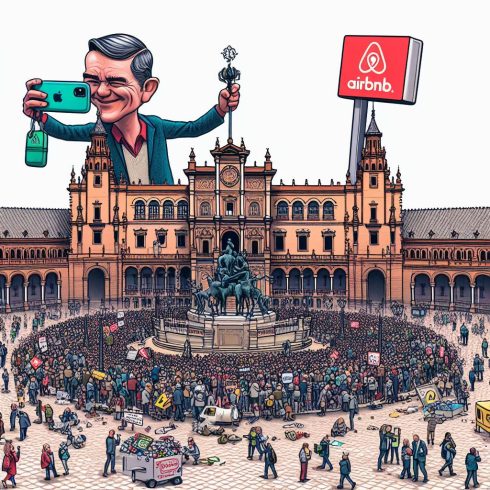
“This is ridiculous when interest rates are soaring and causing a big rise in mortgages.
“In fact, it is costing us more than €1,000 extra per month and we simply can’t cover the costs.”
While she insisted she does ‘really understand’ both sides of the argument she feels there are not enough incentives for homeowners to rent out long term.
It is why many are only letting out to students, who leave after a year, or teachers, who leave before the summer.
“It is much more convenient to hand over the properties to a management company and rent them out as tourist accommodation,” continued Ferrer.
“There’s also a big feeling of hostility against landlords, as if I’m some evil billionaire which is ridiculous.
“I’ve sacrificed so much to be able to invest in property. I’ve been saving since my early 20s, missed out on holidays for years and decided against sending my kids to private school so that I could save and invest.
“I really understand both sides but I simply can’t cover the costs, it’s impossible.
“The government, both in Madrid and in Andalucia, needs to work out ways to make it worthwhile to rent out long term. Until they do we have no other choice.”

